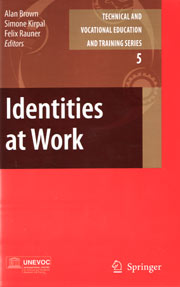
The UNESCO-UNEVOC International Centre: Who We Are | What We Do | Working With Us | Get in Touch
The UNEVOC Network: Learn About the Network | UNEVOC Network Directory
For Members: UNEVOC Centre Dashboard
Thematic Areas: Inclusion and Youth | Digital Transformation | Private Sector Engagement | SDGs and Greening TVET
Our Key Programmes & Projects: BILT: Bridging Innovation and Learning in TVET | Building TVET resilience | TVET Leadership Programme | WYSD: World Youth Skills Day
Past Activities: COVID-19 response | i-hubs project | TVET Global Forums | Virtual Conferences | YEM Knowledge Portal
Our Services & Resources: Publications | TVET Forum | TVET Country Profiles | TVETipedia Glossary | Innovative and Promising Practices | Toolkits for TVET Providers | Entrepreneurial Learning Guide
Events: Major TVET Events | UNEVOC Network News
 Alan Brown, Simone Kirpal and Felix Rauner (eds.).
Alan Brown, Simone Kirpal and Felix Rauner (eds.).
Published 2007,
English,
406 pages,
Hardcover,
ISBN 978-1-4020-4988-0
This book is the fifth volume of the UNESCO-UNEVOC Book Series “Current Developments in Technical and Vocational Education and Training: Issues, Concerns and Prospects”. It brings together international theory and empirical research that deals with continuity and change of identity formation processes at work under conditions of modern working processes and labour market flexibility. Modern work processes in manufacturing and service organisations increasingly rely upon responsible and competent employees who are willing and able to engage in the tasks that their job requires and in continuous learning. This book connects the debates about skills formation, human resources development and the work commitment and professional orientations of individuals.
Order
Buy this book from Springer Science and Business Media